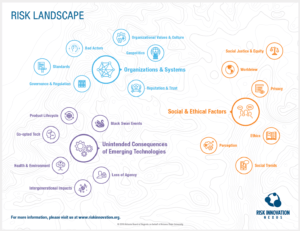The Risk Innovation Nexus, a partnership between the School for the Future of Innovation in Society and the J. Orin Edson Entrepreneurship + Innovation Institute at Arizona State University, has developed a unique array of tools and techniques to help entrepreneurs and the entrepreneurially-minded navigate an increasingly complex risk landscape.
While entrepreneurs and innovators are no stranger to risk, we have observed a growing chasm between conventional risk management and the types of risks that defy convention, risks that we refer to as “orphan risks.” These risks involve the often-complex dynamic between emerging technologies and society, and are increasingly likely to blindside enterprises just like yours.
Today’s post highlights Orphan Risks as well as the insights, tools, and approaches needed to develop a risk innovation mindset and help you navigate an increasingly complex risk landscape.
Is Risk Innovation for me?
The risk innovation approach is for entrepreneurs, innovators, project managers, and anyone who is developing and using an entrepreneurial mindset in their work. It provides you with new ways of understanding and navigating risks that may otherwise prevent you from succeeding in what you set out to achieve.
Developing a risk innovation mindset takes a few key ingredients – identify what is important, to whom it is important; what can threaten that value; and how to respond with agility.
Start here:
Risk innovation methodologies will help you develop the agility, resilience, and foresight needed to advance your own work and build a better future.
If you’re new to risk innovation, or unsure where to start, we encourage you to check out the Risk Innovation Foundations, Risk Innovation Mindset, and Introduction to Orphan Risks videos featured on the Risk Innovation Nexus Activity Guides page. These videos will introduce you to our overarching concepts and methodologies, and set you up for success when using our tools.
Identify orphan risks:
Building on the concept of risk as a threat to value, we have developed a series of questions that explore what may be most important to your enterprise and its stakeholders.
From our Activity Guides page, you will find three separate videos that walk you through questions associated with each of our three orphan risk domains: Social & Ethical Factors; Unintended Consequences of Emerging Technologies; and Organizations & Systems.
Our question cards serve as a conduit to understanding which orphan risk(s) are most applicable to your organization or project. Each question aligns with a number of orphan risks. And so, if you find a question that is applicable to you, your organization or project, we suggest reviewing the associated orphan risks. Our orphan risk definition cards can be found here.
Let’s look at an example:
“How could evolving regulations and norms around the use of personal data affect your business?”
If this question resonates with you – maybe your website or app collects user information, but you haven’t set a process of what you’ll do with that data; maybe you already have a process, but you’ve learned of changes in regulations that will likely impact it – then we recommend you spend some time looking into the associated orphan risks: Governance & Regulation, Standards, Reputation & Trust, Privacy, Social Trends, and Loss of Agency. As a reminder, our orphan risk definition cards can be found here. And check out our Flo case study to learn more about the real-world impacts of these orphan risks.
What next?
Now that you know which orphan risks may threaten your organization or project, it’s time to map your orphan risk landscape and plan steps to navigate through them. Check out our Activity Guides page for how-to videos and downloadable templates.
We hope you’ll follow along with the rest of our videos and activities, and use the risk innovation approach and methodologies to develop the agility, resilience, and foresight needed to advance your own work and build a better future. Happy navigating!






